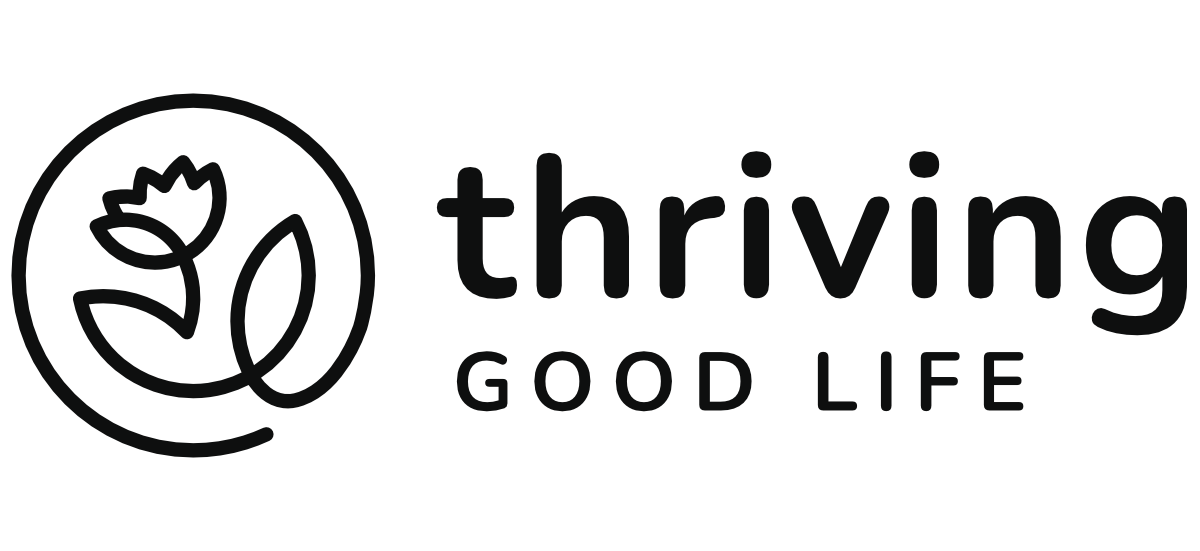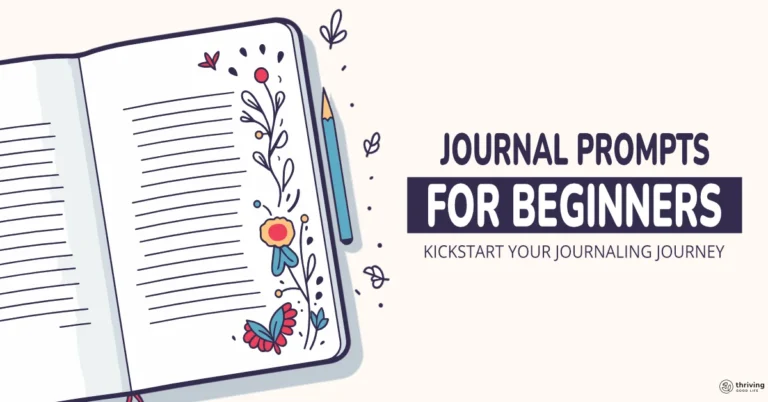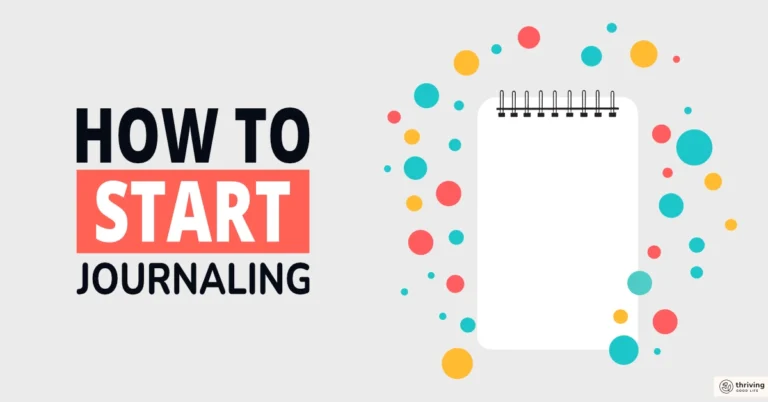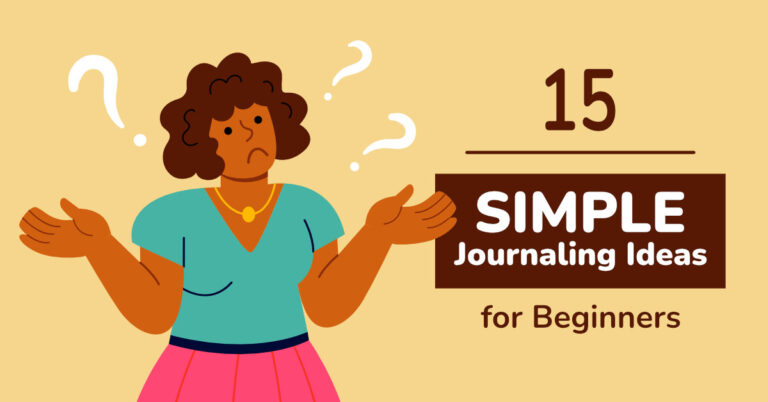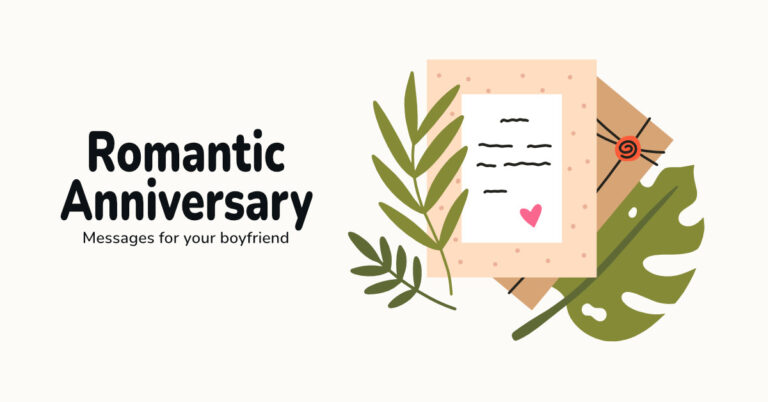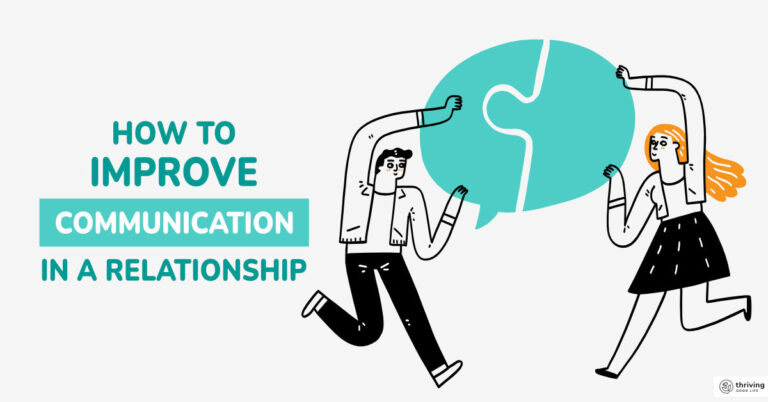Journaling helped me see that ghosting people wasn’t about them, it was about avoiding discomfort. If you’ve ever felt that same urge to disappear, writing might help you choose honesty over silence.
I’ve ghosted a grand total of two people in my life.
And both times, I felt like the worst kind of human.
Ghosting has never sat right with me.
It’s a cowardly move, and I own that. I did that. But I don’t want to be that person.
I get why people do it though.
Sometimes it feels easier to vanish than explain.
To disappear instead of disappoint.
Journaling helped me understand what was really happening when I chose silence over honesty. And now, when I get that urge to pull back or go quiet, I write about what’s going on.
Why Do People Ghost?
Ghosting is more common than we care to admit. It gets a bad rep. And so it should.
If we’re honest, most of us have had the urge to ghost, even if we didn’t follow through.
You know that feeling when someone texts when it’s not a good time.
You see their name pop up, and instead of responding, you put your phone face down.
When you tell yourself you’ll reply later, but then it gets too late to bother.
When you’ve tried typing a response three times, but delete each one because nothing sounds right.
Here’s what journaling showed me:
That urge to disappear usually isn’t about the other person. It’s about us. It’s about what we’re avoiding, what we’re not saying, what we’re scared to feel.
And it’s not just romantic situations where we feel this.
It’s the job interview we’re dreading. The friend whose energy feels draining.
The social invitation we don’t want to accept.
In those moments, silence feels easier. Sometimes we choose to ghost.
Join the Reflect & Thrive Newsletter
It’s like having coffee with a deep-thinking friend
Real stories. Sharp observations. Journaling prompts worth saving. No BS. Just wisdom you can actually use delivered every two weeks. (Don’t forget to bring the cookies 🍪☕)
My Experience With Ghosting People
Let me tell you about my ghosting history, because understanding why I did it taught me everything about why I don’t anymore.
The Sweet Guy
I was young, early twenties, and started dating a friend of a friend’s kid brother.
The guy was genuinely lovely. Kind, thoughtful, sweet.
The type who’d remember little things I mentioned in passing. But, being young and dumb, I just didn’t feel that spark. You know the one I mean. That undeniable pull that makes you excited to see someone’s name ping on your phone.
Our last date was at the cinema. Perfectly nice, but I was bored.
I was booored by him.
I knew I didn’t want to keep seeing him. I just didn’t know how to say that without crushing someone who’d done absolutely nothing wrong.
A few days later, he called. I saw his name, felt my stomach drop, and let it go to voicemail.
I told myself I’d call back when I figured out what to say.
Then he called again. Same thing happened.
The longer I waited to return his calls, the more embarrassed I became about not responding. What started as me trying to find the right words turned into me avoiding having a tricky conversation.
I felt bad about it. I still kinda do.
[Dear sweet guy, if you ever stumble across this post, know that it wasn’t you. It was all me and you deserved better than my silence].
The Amateur Boxer
He was fit. But his ego was the size of his punch bag.
We’d dated briefly, but he was way more interested in himself than he’d ever be in me, so when things naturally fizzled, I was actually relieved.
A few years later, and he’s calling my phone.
Curious, I picked it up.
We talked for a bit, filling each other in on what was going on in our lives, and just before we ended the call he asked me out.
I said I’d think about it. A small part of me was intrigued… flattered even.
But when he called a week later, I didn’t pick up.
I’d started remembering why things didn’t work out the first time.
That, and when a friend causally said: “You know he’s probably looking through his little black book, desperately trying to find someone… anyone”.
He started texting. I didn’t want to be his ‘anyone’, so I never replied.
He tried a couple more times before, much to my relief, giving up on me.
Again, I chose silence instead of politely telling him I wasn’t interested.
What Journaling Taught Me About Avoidance
Both times I ghosted, I told myself I was being kind.
I was avoiding hurting someone’s feelings.
I was sidestepping an awkward conversation.
But all I was doing was prioritizing my comfort over my honesty.
Here’s what clicked for me:
I hadn’t learned how to effectively communicate difficult things. I thought there was some perfect way to let someone down gently, and since I couldn’t find it, I said nothing at all. Nobody had taught me that “I don’t think we’re a good match” was enough.
I’m not responsible for someone else’s emotions. I was waiting for the “right” words that would somehow make rejection painless. Rejection is never painless, and we become better humans when we can learn to handle the crap life throws at us. I was doing them a disservice.
Silence felt like protection, but it made me feel bad about myself. Every time I avoided a conversation, I carried it. That weight didn’t disappear. It just turned into some low-key guilt about unfinished business. Not something you want lingering in the background of your life.
Through journaling I could hold myself accountable for what I did, but without the judgment.
I could write about my discomfort, explore where it came from, and practice different ways of handling similar situations.
Journaling didn’t just help me face awkward conversations. It helped me get clearer on what kinds of connections I wanted in the first place.
If you’ve seen some red flags and want to avoid messy situations before they start, journaling can help with that too.
What Happens When You Stop Ghosting
Difficult conversations are still difficult. I think they always will be.
But when you can have them without running away, you keep your self-respect intact.
Sure, you’ll piss off a few people.
They might get defensive or try to argue.
But you’ll start attracting people who appreciate your directness. Most healthy-minded people appreciate knowing where they stand. Even when it’s not where they hoped to be.
You stop carrying around guilt about situations you left unresolved. But maybe most importantly, you start trusting yourself to handle whatever response comes your way.
5 Journal Prompts to Help You Avoid Ghosting Someone
These are the questions I ask myself when silence feels easier than honesty.
What am I actually afraid of here? Usually, it’s not the conversation itself but the assumptions about how it will go. Am I afraid they’ll be angry? Hurt? Will they try to change my mind? Once I name the fear, it becomes manageable.
What would I say if I had to say something right now? This question cuts through the overthinking. If someone put a gun to my head and demanded honesty, what would come out? “I don’t think we’re a good match” or “I’m not ready for this right now.”
Is my silence protecting me or just postponing a conversation I need to have? Sometimes we do need space to process our thoughts. But there’s a difference between taking time to think and indefinitely avoiding communication.
How would I want to be treated in this situation? Would I rather hear a kind but direct “no” or be left wondering where I stood?
What’s the worst possible outcome if I’m honest? Not the catastrophic scenarios my brain creates, but the absolute worst that could happen. Okay, someone might be disappointed, sure. But they’d also have clarity, which is what most people really want.
Feel free to steal these.
Use them next time you feel that urge to go all radio silence on someone.
Related: How to Start a Journal
How to Build Better Habits Around Honest Communication
If you recognize yourself in any of this, here’s what will help you build better habits:
Practice Being Direct.
Do this in low-stakes situations. Say no to social invitations honestly instead of making up elaborate excuses.
Try it on the telemarketers or door-to-door canvassers. Next time they catch you off guard say a firm: “I’m not interested. Bye.”
Do that instead of abruptly hanging up or hiding behind the door.
Write first, send later.
When you’re unsure how to respond to someone, write your thoughts in a journal first. This helps you get clear on what you actually want to communicate.
Remember that kind doesn’t mean vague.
You can be gentle and direct at the same time.
Saying things like: “I don’t think we’re a good match, but I wish you well” is honest and considerate. And you can go about life knowing you did the decent thing.
Focus on your values.
What kind of person do YOU want to be?
Someone who communicates clearly?
Someone others can count on for honesty?
Let those values guide your actions, even when it’s uncomfortable.
The urge to disappear, without saying why, teaches us something about ourselves.
And if we value growth, we need to make space to sit with it, to understand it, and then to promise to use our words in future. Journaling gives us somewhere to explore our patterns, understand our fears, and practice better responses before we need them in real life.
The alternative to ghosting isn’t having perfect conversations every time. It’s having the courage to show up honestly, even when we’re not sure what to say.
Even when it’s awkward.
Even when we’d rather disappear.
Our relationships, especially the one we have with ourselves, deserves that kind of honesty.
Want more insights like this? Join Reflect & Thrive – my newsletter for thoughtful perspectives on relationships and practical ways to use journaling for real growth.
Join the Reflect & Thrive Newsletter
It’s like having coffee with a deep-thinking friend
Real stories. Sharp observations. Journaling prompts worth saving. No BS. Just wisdom you can actually use delivered every two weeks. (Don’t forget to bring the cookies 🍪☕)
If this post spoke to you, share it with someone who’ll appreciate it.
